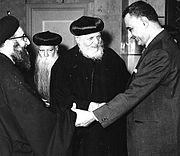Copts in Egypt
[16][17][18][19] According to scholars Maristella Botticini and Zvi Eckstein argue that Copts have relatively higher educational attainment and relatively higher wealth index, due to Coptic Christianity emphasis on literacy and that Coptic Christianity encouraged the accumulation of human capital.
[21]Under Muslim rule, the Copts were cut off from the mainstream of Christianity, and were compelled to adhere to the Pact of Umar covenant, thus assigned to Dhimmi status.
Pope Cyril IV, 1854–61, reformed the church and encouraged broader Coptic participation in Egyptian affairs.
Some prominent Coptic thinkers from this period are Salama Moussa, Louis Awad and Secretary General of the Wafd Party Makram Ebeid.
In 1952, Gamal Abdel Nasser led some army officers in a coup d'état against King Farouk, which overthrew the Kingdom of Egypt and established a republic.
Pharaonism was widely held by Coptic and Muslim scholars in the early 20th century, and it helped bridge the divide between those groups.
However, some Western scholars today argue that Pharaonism was a late development shaped primarily by Orientalism, and doubt its validity.
Although the law was eased in 2005 by handing down the authority of approval to the governors, Copts continue to face many obstacles and restrictions in building new churches.
"Twenty Christians and one Muslim were killed after violence broke out in the town of el-Kosheh, 440 kilometres (270 mi) south of Cairo".
[32] Journalist John R. Bradley writing around 2008 noted that " ... other longstanding Coptic complaints include the under-representation of Christians in the police, judiciary, armed forces, civil service, government, and education system.
[36] However, many Copts continue to complain of being minimally represented in law enforcement, state security and public office, and of being discriminated against in the workforce on the basis of their religion.
[39] Official and unofficial discrimination against Copts occurs in forms such as disadvantages in education and the judicial system, violence from Islamic militants, and restrictions on religious activity and expression.
[42] In 2007, a Cairo administrative court denied 45 citizens the right to obtain identity papers documenting their reversion to Christianity after converting to Islam.
[43] However, in February 2008 the Supreme Administrative Court overturned the decision, allowing 12 citizens who had reverted to Christianity to re-list their religion on identity cards,[44][45] but they will specify that they had adopted Islam for a brief period of time.
The decline in the Jewish representation is interpreted through the creation of the state of Israel, and the subsequent emigration of the Egyptian Jews.
The Facebook page of the Muslim Brotherhood's Freedom and Justice Party was "rife with false accusations meant to foment hatred against Copts", according to journalist Kirsten Powers.
[49][52]An Egyptian court on February 25, 2016, convicted four Coptic Christian teenagers for contempt of Islam, after they appeared in a video mocking Muslim prayers.

